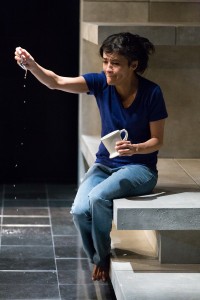
The tragic news of Phillip Seymour Hoffman’s death by OD has, for the moment, wrested the subject of substance abuse from the shadows and thrust it into the limelight. With addiction trending, the Arden Theatre’s presentation of WATER BY THE SPOONFUL couldn’t be more timely.
Playwright Quiara Alegria Hudes won the 2012 Pulitzer prize in drama for this play, which met the requirements of “a distinguished play by an American author, preferably original in its source and dealing with American life.”
In WATER BY THE SPOONFUL, part two of THE ELLIOTT TRILOGY, a former marine, home from Iraq, must confront his issues and family members, even as he’s haunted by a black-clad Arab. The Arab character emanates from the less well-known first play of the trilogy, ELLIOTT, A SOLDIER’S FUGUE (which I, and I assume many in the audience, haven’t seen). However, we do catch the drift.
The story takes place simultaneously in Philadelphia and in the overlapping world of cyberspace. Elliott (Armando Batista), who has found work at Subway, converses at length with his cousin, Yaz (Maia DeSanti), who has worked her way up and out of the ‘hood to become an adjunct professor, teaching music at a prestigious college. (It’s a treat to hear bits of Coltrane, who “democratized the notes,” worked in.) Yaz lectures on dissonance, hooking into a theme that practically defines her life, and extends to the lives of other characters, who crave consonance in a world that’s discordant in terms of culture and dependency. The dissonance also informs the overall idea of characters existing on different planes.
Characters include the compassionate site administrator of an addiction chat room (Karina Arroyave) and the denizens of the virtual, confessional, computer-world that she facilitates (played by Kevin Bergen, Bi Jean Ngo, and Brian Anthony Wilson). Turhan Caylak plays the ghost and other roles. The actors handle the challenge of this intricate work well. Particularly noteworthy are Wilson, Ngo, and Arroyave.
Structurally, WATER BY THE SPOONFUL is a beautifully woven work of art. Hefty threads of fathers, mothers, resentment, and addiction run through it. But this is not one of those educational, proselytizing lectures. There are no wasted encounters, and all the scenes are key scenes, although many could use judicious cropping. The characters fit into a complex pattern. Starting as sketches, they gradually fill out, taking on dimension and emotional weight. As their facets are revealed and their relationships exposed, parts of the story that seemed widely disparate connect in strong and dramatic ways.
The Latino, black, Asian, and white people represented are not simply stereotypes spouting POVs. Burdened by intense self-absorption, fears, bitterness, and personal tragedies, these characters have a chance to become receptive to opening up and caring.
The playwright uses the idea of the internet to carry long monologues, but the play still gains traction as it moves along. Several funny bits, however, don’t attract all the chortles they deserve in this Very Serious Staging.
Philadelphia is represented in the text by a few place names that are thrown in. The play could lay claim to any number of cities by substituting mentions of a couple of local streets and institutions. A lone mural, glimpsed behind part of the set, offers no Philly vibe.
On the Arden’s Arcadia stage the expansive, grey concrete slab-inspired set with flat cold light, distances and chills where crucial scenes of remembrance or reconciliation need more warmth, a sense of place, and connection. However, the set design’s cold atmosphere does favor the multiple virtual locations of the cyber world, where its starkness lends a kind of clarity.
A bit of the shine rubs off even fine, bright work when it goes on too long. A leaner, tighter iteration of this admirable play is something devoutly to be wished for. But it’s a valuable theater experience to watch how the separate, intricate pieces of Hudes’s work eventually come together to offer revelations.
